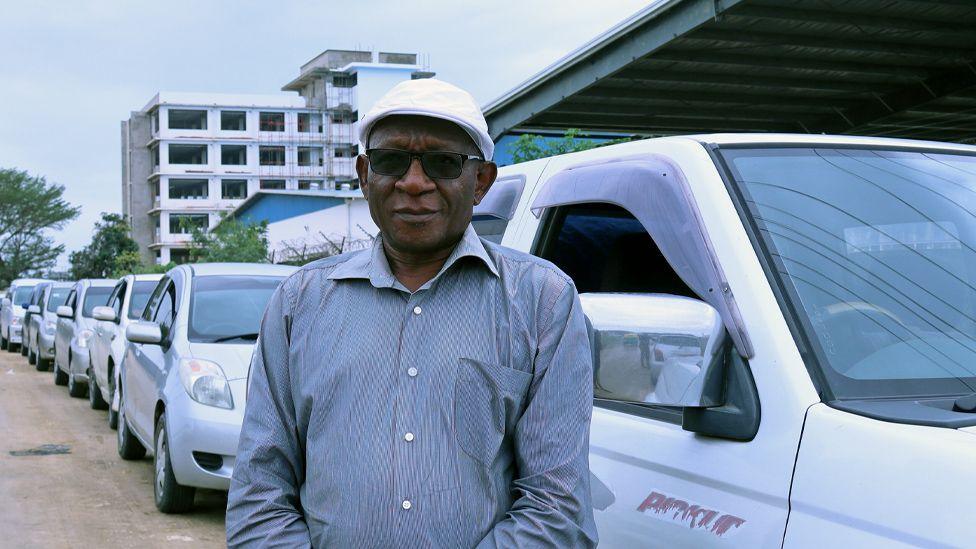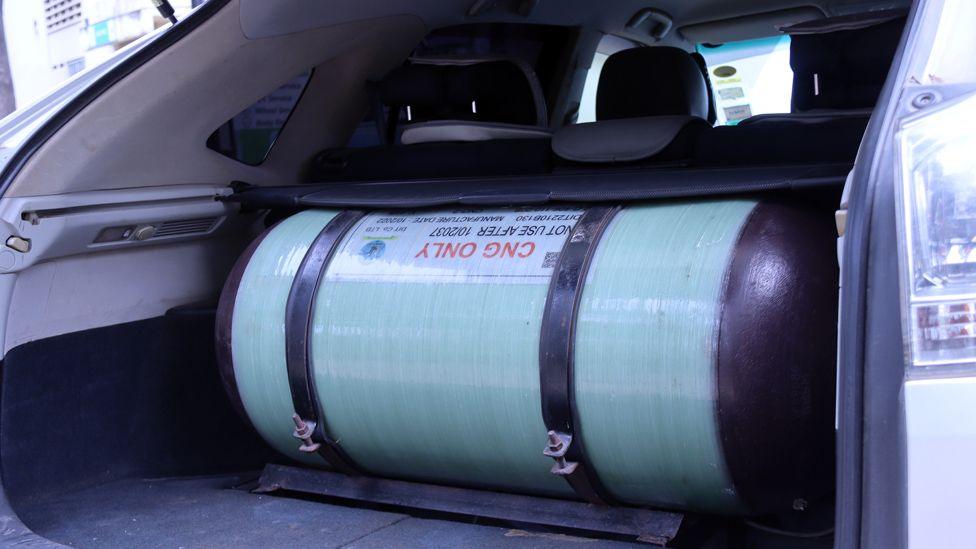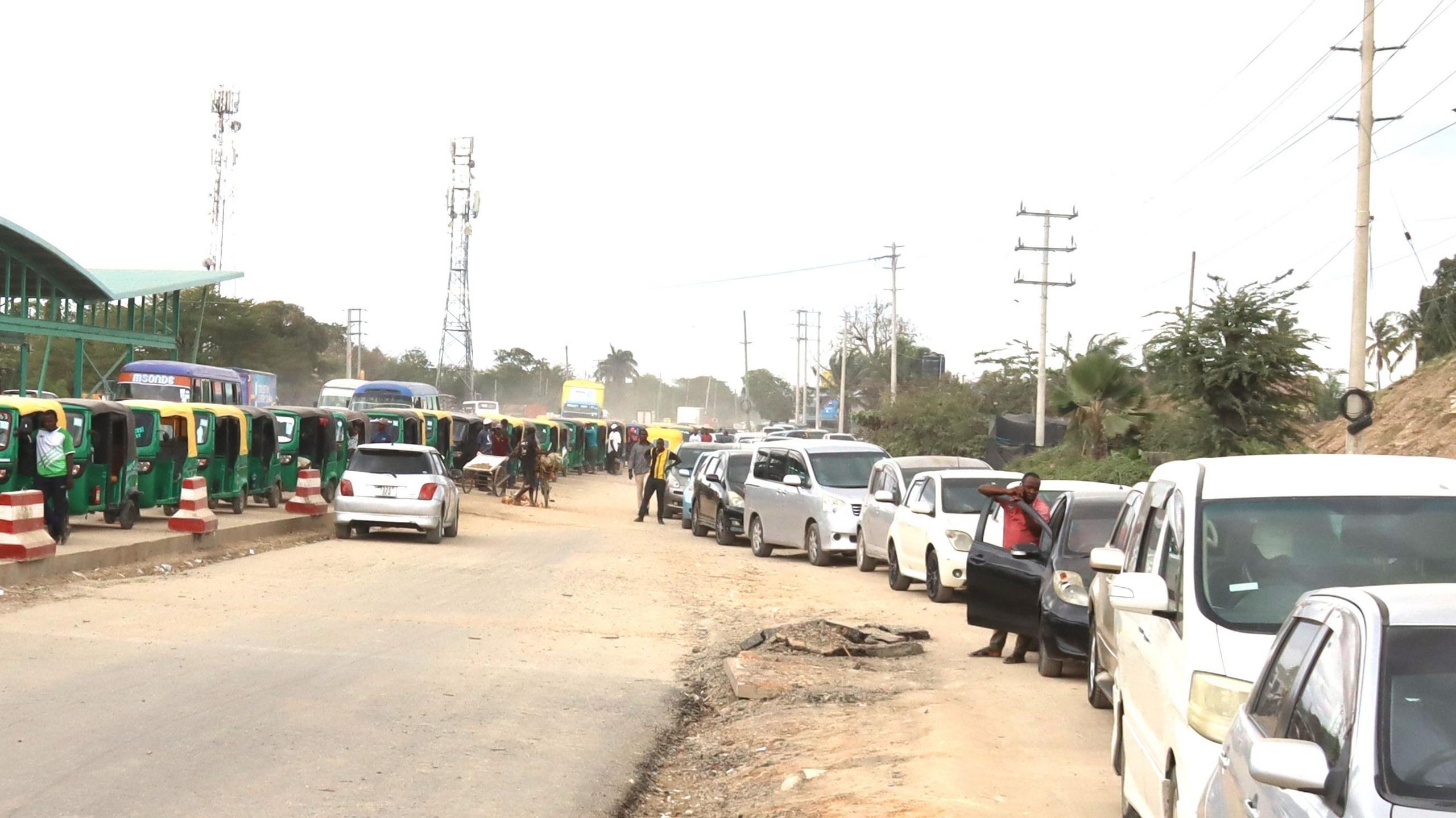A revolution in vehicle fuel is gaining momentum in Tanzania, but a lack of filling stations means it is stuck in second gear.
Like Nigeria and some other countries on the continent, Tanzania is beginning to embrace compressed natural gas (CNG) as an alternative to petrol and diesel.
It is seen as cleaner and better for the environment than those fossil fuels, but its relative cheapness is the biggest draw for the 5,000 or so motorists in the East African state who have embraced the change - particularly commercial drivers.
This represents a small fraction of Tanzania's vehicles, but the early adopters are paving the way for a wider acceptance of CNG - the government reportedly wants near total adoption by the middle of the century.
Tanzania has large reserves of gas under the sea and for those filling up, CNG can cost less than half its petrol equivalent.
The potential saving was enough to persuade taxi owner Samuel Amos Irube to part with about 1.5m Tanzanian shillings ($620; £495) to convert his three-wheeled vehicle – known locally as a bajaji - to CNG.
But now, having to get the gas twice a day, he often spends more time waiting at a filling station in the largest city, Dar es Salaam, than he does earning money.
There are only four places in Tanzania's commercial hub where he can fill up.
Quietly frustrated, he says he has to wait for at least three hours every time he wants to refuel, but the savings make it worth it, as he spends just 40% of what he would on the equivalent amount of petrol.
The slow-moving queues of vehicles at the Ubungo CNG station snake down the road. Things are orderly – there are three clear lines, one for cars and two for bajajis – but the irritation is palpable.
Medadi Kichungo Ngoma, in the queue for two hours already, stares at the vehicles ahead of him as he waits by his silver pick-up truck.

Medadi Kichungo Ngoma remembers when refuelling used to be easy
He tells the BBC that he was among the first people in the city to convert his vehicle, which involved installing a large cylinder in the back of the pick-up, and reminisces about the short queues.
"Sometimes the attendant would have to be called to serve us," he says.
He complains that the infrastructure has not expanded to accommodate the increasing demand.
This is also the refrain heard at the largest of the city's CNG filling stations near the airport.
Sadiki Christian Mkumbuka has waited here for three hours with his bajaji.
"The queue is very long," he says, adding that "we should have as many stations as there are for petrol vehicles".
But the price consideration will keep people coming back.
"I pay 15,000 shillings ($6; £5) to fill my 11kg gas tank, which goes for about 180km," says another motorist who introduces himself as Juma, adding that this is less than half the cost for petrol to cover the same distance.

The CNG tank has to be installed in the boot of a vehicle by an approved fitter
The push to encourage motorists to adopt CNG-powered vehicles in Tanzania was hatched over a decade ago but did not begin in earnest until 2018.
Those in charge of the project acknowledge that they did not foresee the rapid rise in demand.
Aristides Kato, the CNG project manager at the state-oil firm, the Tanzania Petroleum Development Corporation (TPDC), tells the BBC that there "has been a very drastic increase" recently in the use of natural gas by vehicle owners.
"We found ourselves not having enough infrastructure to support the demand for gas-using vehicles," he admits.
The authorities, though, want more people to switch to CNG because it is a relatively clean-burning fossil fuel that results in fewer emissions of nearly all types of air pollutants, according to the UN.
Plus the locally available natural gas should allow for cheaper prices than petrol. But the cost of converting a vehicle plus the lower mileage that a full tank gives a motorist compared to petrol or diesel may be putting some people off.

Long queues are the norm at the airport CNG station near Dar es Salaam
However, the country manager of Taqa Arabia, an Egyptian company that runs the filling station near the airport, sees the growing demand as a "positive sign that CNG use has started to develop in Tanzania".
Amr Aboushady says his firm plans to build more stations and hopes to "replicate our success story in Egypt by helping the [Tanzanian] government best utilise natural gas as an affordable, reliable, cleaner source of energy".
Egypt has pioneered the use of CNG on the continent, with about half a million vehicles converted to a dual-fuel system since the 1990s.
Other African countries that have approved CNG use for vehicles include South Africa, Kenya, Mozambique and Ethiopia.
The authorities in Tanzania are committed to rolling out more infrastructure and hope to encourage more private investors to get involved.
A central CNG "mother station" is being built in Dar es Salaam by TPDC, which will supply gas to smaller stations around the country.
In addition, TPDC is acquiring five mobile CNG units that will be located in Dar es Salaam as well as the capital, Dodoma, and Morogoro.
These measures should in the medium-term lead to shorter queues, but for the time being the lack of filling stations will continue to frustrate Tanzania's CNG pioneers. By Basillioh Rukanga & Alfred Lasteck, BBC




